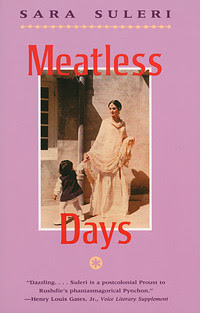Here is a phrase that comes to mind when I think of Sara Suleri’s Meatless Days: absolute gibberish. If that’s not effective enough, here is another one: complete twaddle.
I’d try to convince you that the book wasn’t really all that bad, but then I’d just be straight out lying. Never have I ever spent more time questioning my own reading habits then when I was reading this endless text of drivel and pointlessness. At one point I started reading it only at night before bedtime, so highly was it guaranteed to make me fall asleep.
“It’s non-fiction, it’s not meant to excite,” I soothed my bored, frustrated soul. But even that wasn’t consolation enough.
Suleri is writing about her family, about postcolonial Pakistan and the effects of migration on the wandering soul, and the only reason I know this is because I read the frankly incredibly misleading blurb. Because nowhere in the book does anything actually make any sense.
Take, for example, exhibit A:
Sometimes, when I feel burdened by this baldest prose - I lived too long with the man of the hairless head - tyrannized by the structure of a simple sentence, it does me good to recollect how quietly my mother measured out her dealings with impossible edges.
Um, what the what now?
The insufferable part of this inexplicable prose is that the WHOLE. DAMN. BOOK is like this. Literally just sentences composed of words strung together to mean god knows what. Some parts make sudden, startling sense so that you are deluded into thinking AHA, I DO know the English language, I can do this. But then Suleri gets worried. Did she drop her metaphorical, allegorical, and utterly incomprehensible rambling for more than two sentences? Abort text! Revert to pretentiousness!
Interestingly enough, it is precisely this ostentatious writing that the blurb sells. There are nine randomly placed chapters of absolutely no order or arrangement in this book. And what I want to know is, what was the editor thinking? Or more to the point, who was the editor of this unbelievably dreary piece of writing? So many questions I have after reading this book, none of which I really care to find the answers to, because the best way to deal with this book is to consciously remove it from your memory and pretend you didn’t actually read it, for fear of regret for all those wasted hours.
And if you think I’m being too harsh, consider exhibit B:
In our early years, those most intensely talkable, Dale and I so savoured the taste of articulating ourselves in each other’s presence that we rarely conversed outside the splendid way life unfolds itself to its most prized audience.
Now what does that mean? What does that even mean? The only possible responses to this book are yawning, rereading of a single line of the text multiple times, or an urgent desire to fling the book through an open window as far away from you as you can. The only times my eyes opened was when Suleri would mention a famous political figure, someone whom the bored recesses of my mind would recognize and struggle to latch onto in a desperate bid to stay awake, but sadly even those moments were few and far between. Even though the author’s father was Ziauddin Ahmed Suleri (1913-1999), a prominent political journalist in the subcontinent as well as activist of the Pakistan movement, the book manages to stay very, very boring. And I’m so very bored of it that I’m going to stop talking about it now, and hope to never have to relive these days again.
Recommendation.
Unless you are particularly interested in pointless tosh, don’t.
